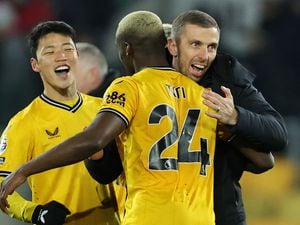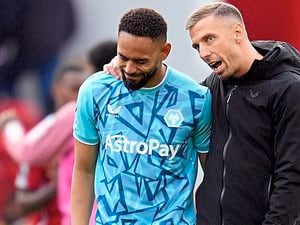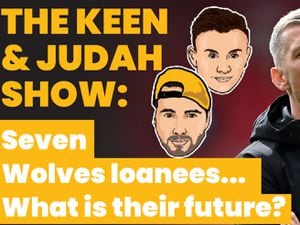Johnny Phillips: Wolves are at a pivotal moment - now’s the time for real leadership
The secret of crisis management is not just a case of achieving a good outcome from a bad situation. It often involves preventing the bad from getting worse.
Wolves are not in a good place right now. The immediate requirement – today – is to pick up some points on the pitch. That is in the hands of Steve Davis and James Collins.
It would be reassuring to discover that the players were accepting some responsibility, too, and uniting behind a common cause at the training ground where a sense of calm has remained despite the increasing angst among the fanbase.
Nine games in, the statistics make for grim reading but the challenges are not insurmountable and three points against Nottingham Forest would assuage genuine fears in the stands.
But what about the new head coach?
Lightning clearly only strikes twice if you are trying to persuade Julen Lopetegui to become manager.
Whereas the Spaniard’s head was turned by another job back in the summer of 2016, this time family is – rightly – far more important than any football matter.
Jeff Shi’s decision to fly to Spain earlier this week was a warning that all was not signed and sealed with a man who already had a good relationship with the Wolves ownership and had expressed a keen interest in the project.
Yet, the chairman would not have bothered boarding the plane if he had not been assured that Lopetegui remained favourable to a move to England.
The rejection was a massive setback.
With all hopes on Lopetegui this time last week, a fresh set of circumstances is being addressed.
Any new candidate knows he is not the first option but that is not a problem for a post like this, which remains hugely attractive despite the current upheaval.
While Lopetegui was number one choice by some distance, Shi had met others prior to his trip to Spain.
History often throws up noteworthy storylines of past mistakes and there is one that the club will not want to repeat.
Wolves’ current form, their form since last spring in fact, is leading to only one outcome. The last time the team was relegated from the Premier League it was significant that decisions at board level were unable to prevent that bad outcome from getting worse.
There are parallels to what is happening now.
The timing of Mick McCarthy’s sacking in February 2012 was questionable.
The failure to land the number one target to replace him, Alan Curbishley, left a void that could not be adequately filled.
And it led to an entirely unsuitable appointment in Terry Connor.
The chain of events – decisions at board level – had disastrous consequences as Wolves, with a squad whose spirit was unravelling by the week, suffered a double relegation.
There is a crucial difference here, a decade on from that turmoil. The season is relatively young and there is time to turn the ship. But strong leadership and decision-making is needed now if Wolves are to pull clear of choppy waters.
Although there was no clear and preferred Plan B before Lopetegui declined the role, the path has now been opened up for a genuine recruitment process.
Shi and his lieutenants have not been completely blindsided by this second knockback from Lopetegui and there is an opportunity to prove this to supporters with their ultimate appointment.
There will by now be a strategy in place stating the requirements of the role and identifying the necessary targets. The owners should not be put off by release clauses if they are conducting a thorough recruitment process. The best can be costly.
Nothing should be off the table: a permanent appointment or an interim boss. But, as we saw with Manchester United’s experience of Ralf Rangnick, temporary solutions can cause as many problems as they solve and the indications are that this is not a preferred route.
What can be ruled out is a Sean Dyche-style appointment or a firefighter with the remit simply to avoid relegation. Wolves under Fosun have always sought dynamic, forward-thinking coaches who offer a progressive style even if they haven’t always found them.
That was the intention with Bruno Lage.
Inside the dressing room there is another issue. There are no natural leaders emerging in the absence of some big personalities who left during the summer.
There are also several players who know they have no long-term future here, be that down to their age, length of contract or likely sale.
Which makes it that little bit harder to envisage any tub-thumping speeches from the trenches.
The squad demands leadership and it requires a figure who will be quickly respected.
Do not underestimate player power in these times. Managerial careers can be over in weeks if there is no buy-in from the dressing room. There are some seriously talented individuals in this group and a strong team ethic must be a priority.
Nuno Espirito Santo, in his first three seasons at least, fostered that team spirit before the cracks emerged during the pandemic.
Nuno is currently employed in Saudi Arabia, with assistants Ian Cathro, Antonio Dias and Rui Barbosa.
He is picking up an astonishing wage and enjoying a stress-free existence in the landscape of a pitiful standard of football.
His interest has been piqued by the events of the last fortnight, and Shi is not ruling anything out at this stage.
There will have to be a compromising walk on both sides of the divide before Nuno can meet in the middle with his former chairman to strike a deal, after the deterioration of their relationship during the 2020/21 season.
Football throws up unlikely scenarios, though. That is the beauty of this game. The fact that the two parties are even in advanced discussions shows how quickly events can turn on their head.
Clarity of thought at times like this can be hard.
The calmest figure to walk the corridors of the Sir Jack Hayward Training Ground and Molineux in recent years is a man called Julio Figueroa.
He was a mentor to many of the players and coaches, an unobtrusive but hugely significant member of Nuno’s backroom staff.
He came into his own when the chips were down and the team was going through tough times collectively and individually.
One of his key tenets was the concept of confronting challenges ‘action by action’.
Over the course of a football match that would not be a preoccupation with the result or a style of play.
It would be the approach to the first minute of the game and then the second one and then the next one. Breaking it all down into moments; a personal duel to be won, a forward move to be completed, a defensive set-up to organise. Action by action.
On a much grander scale it feels like Wolves have reached the position where they need to adopt this approach of deconstruction.
To calmly deal with what is in front of them, stage by stage.
The first challenge is Nottingham Forest. Then after that, how does the team best prepare for Crystal Palace?
What is the scenario that the club wants to achieve by the following weekend?
Another challenge is to identify a strong list of managerial targets.
Then take control of the head-hunting and the interview process. There is a need to mentally start afresh in the dressing room. Identify what these players need and how best they can take the team forward.
Tackle each scenario in a measured and considered way.
The current situation, however bleak it appears, is far from a lost cause and the potential for the new head coach to turn this around is apparent with a squad of players who can perform better, and a first-class training facility as a workplace. October 2022 at Wolves may turn out to be a case study in crisis management – for better or worse.
Supporters fear that the club is on the edge of a precipice.
It is to be hoped that, action by action, the leadership here can ensure there is a positive story to tell by the end of this testing period.





